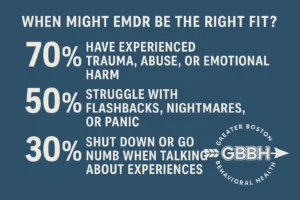If you’re here, it’s probably not because you’re wondering whether to get help. It’s because you’re wondering what kind of help might actually work. That shift—from “Do I need therapy?” to “Which type of therapy is right for me?”—is quiet, powerful, and often overlooked.
It usually happens after a moment you don’t forget: waking up feeling hollow again. Snapping at someone you love and not knowing why. Breaking down in the car for the third time this week. Realizing the way you’re coping isn’t working anymore.
And if you’re holding that kind of awareness, that’s already brave.
At Greater Boston Behavioral Health, we work with people who are ready to try something different—even if they’re scared, skeptical, or unsure where to begin. Whether you’re seeking support for trauma, anxiety, or emotional burnout, two options you might come across are EMDR therapy and traditional talk therapy.
So let’s gently walk through the difference—and help you feel more clear about your next step.
What Is EMDR Therapy?
EMDR stands for Eye Movement Desensitization and Reprocessing. It’s a structured therapy developed for people struggling with trauma, PTSD, and other emotional wounds that seem “stuck” in the body or mind.
But here’s the part most people don’t expect: EMDR doesn’t require you to rehash every detail of what happened. In fact, you may not need to say much at all.
Instead of talking your way through trauma, EMDR uses something called bilateral stimulation—usually eye movements or tapping—to help your brain “unstick” the memory and file it away properly. That can reduce the emotional intensity, physical stress, and mental reactivity tied to the memory.
Think of it this way:
EMDR is like helping your brain finish a task it got interrupted doing. The memory is there, but your system never got to file it under “safe.” EMDR gently helps complete the filing process—so you stop reliving it, and can finally move forward.
You’re awake, alert, and in control the whole time. EMDR doesn’t erase memories—it changes how they affect you.
What Is Traditional Talk Therapy?
Talk therapy is exactly what it sounds like: you sit down with a therapist and talk. That might include processing your past, discussing current struggles, or learning new tools to manage emotions and behaviors.
There are many approaches within talk therapy—like:
- Cognitive Behavioral Therapy (CBT): Helps identify and shift unhelpful thought patterns.
- Psychodynamic Therapy: Explores how your early experiences may be influencing you now.
- Humanistic Therapy: Focuses on self-growth, values, and the present moment.
- Interpersonal Therapy: Supports relationship and communication issues.
The right approach for you often depends on your goals and how you process emotions.
For many, talk therapy is like building a relationship with yourself—with someone safe helping guide the conversation.
It’s a space to think out loud, say the hard thing, or finally feel seen in your story.
What Makes EMDR Different from Talk Therapy?
While both therapies aim to reduce emotional pain and help you live more fully, their methods, goals, and pace are different.
Here’s a simplified breakdown:
| EMDR Therapy | Talk Therapy | |
|---|---|---|
| Main Goal | Process stuck trauma responses | Explore emotions, thoughts, relationships |
| Technique | Bilateral stimulation + guided memory processing | Verbal dialogue + insight-building |
| Verbal Sharing | Minimal (you don’t have to talk it all out) | High (your story is the main tool) |
| Session Structure | Highly focused and structured | Flexible, conversational |
| Best Fit For | Trauma, PTSD, flashbacks, emotional shutdown | Anxiety, depression, self-worth, life challenges |
| Duration | Often shorter-term for specific issues | Can be short- or long-term depending on goals |
Some people feel more comfortable easing into their story over time (talk therapy). Others want to target specific trauma or symptoms head-on (EMDR).
There’s no wrong answer—just different doors in.
When Might EMDR Be the Right Fit?
EMDR is often recommended if:
- You’ve experienced trauma, abuse, or ongoing emotional harm
- You struggle with flashbacks, nightmares, or panic that feels disconnected from the present
- You’ve done talk therapy before but still feel stuck in the same loop
- You shut down or go numb when trying to talk about your experiences
- Your trauma feels “pre-verbal” or hard to explain
Even if you don’t have one big, obvious trauma, EMDR can still help. Many people have what’s called complex trauma—a series of smaller emotional injuries that add up over time.
When Might Talk Therapy Be a Better Starting Point?
Talk therapy can be a great option if:
- You’re navigating anxiety, depression, or stress and want new coping skills
- You’re facing relationship challenges or communication struggles
- You want space to explore your emotions, identity, or past at your own pace
- You feel ready to talk—but not sure where to begin
- You’re newly diagnosed and need support integrating that
Talk therapy also works well when you’re unsure what’s going on emotionally but you know you don’t feel like yourself.
If EMDR is the laser, talk therapy is the light. Both bring clarity—but in different ways.
Can You Do Both?
Yes—and many people do.
Sometimes clients start in talk therapy to build trust and emotional safety, then add EMDR later to process trauma more directly.
Other times, EMDR helps resolve a core trauma quickly, and then talk therapy supports rebuilding life, self-esteem, and relationships after the storm.
At Greater Boston Behavioral Health, our clinicians can help you decide what to start with—and shift the plan if your needs change. Therapy should adapt to you, not the other way around.
What’s It Like to Start EMDR in Boston, MA?
At Greater Boston Behavioral Health, we’ve helped many people who never thought they’d try EMDR—or who were nervous it would be too intense.
Here’s what we hear most often after just a few sessions:
“I didn’t have to tell my whole story, and I still feel lighter.”
“It’s like I can breathe again.”
“That memory used to own me. Now it just feels… neutral.”
If you’re looking for EMDR in Needham, MA or surrounding areas, our trauma-informed team offers a safe, nonjudgmental space to explore whether it’s right for you.
You Don’t Need to Know the Perfect Path—Just the First Step
Let’s be honest: trying to choose the “right” therapy can feel like another thing to get wrong. But here’s the thing—we won’t let you fail at this.
You don’t have to show up knowing what you need. You just have to show up.
Whether you start with EMDR, talk therapy, or just a conversation with our team, healing doesn’t begin when everything is figured out. It begins when you reach out.
FAQs About EMDR and Talk Therapy
Is EMDR only for people with PTSD?
No. EMDR is effective for anyone struggling with trauma-related symptoms—whether from a single event or ongoing emotional pain. Many clients with anxiety, phobias, or chronic stress also benefit.
Can I do EMDR if I don’t want to talk about what happened?
Yes. One of EMDR’s strengths is that it doesn’t require you to share every detail aloud. You and your therapist will agree on a “target memory,” but the processing happens internally with your therapist guiding the process.
How many EMDR sessions do I need?
It depends. Some clients see improvement in just 6–12 sessions. Others with complex trauma may benefit from a longer course. You’ll move at a pace that feels safe and manageable.
Is EMDR safe?
Yes—when conducted by a trained, licensed professional. EMDR is backed by decades of research and is recommended by organizations like the American Psychological Association and the World Health Organization for trauma treatment.
Can I switch from talk therapy to EMDR (or vice versa)?
Absolutely. Your therapist can help you decide when (or if) it’s the right time to switch. Many clients integrate both approaches over time.
How do I start EMDR in Boston?
You can start by calling us or requesting a consultation. We’ll walk you through what to expect, match you with a trained EMDR clinician, and support you every step of the way. Click here to learn more.
Call Us—We’ll Help You Find Your Way Forward
Call (888) 450-3097 to learn more about our EMDR services in Boston, Massachusetts. You don’t have to carry this alone anymore.


